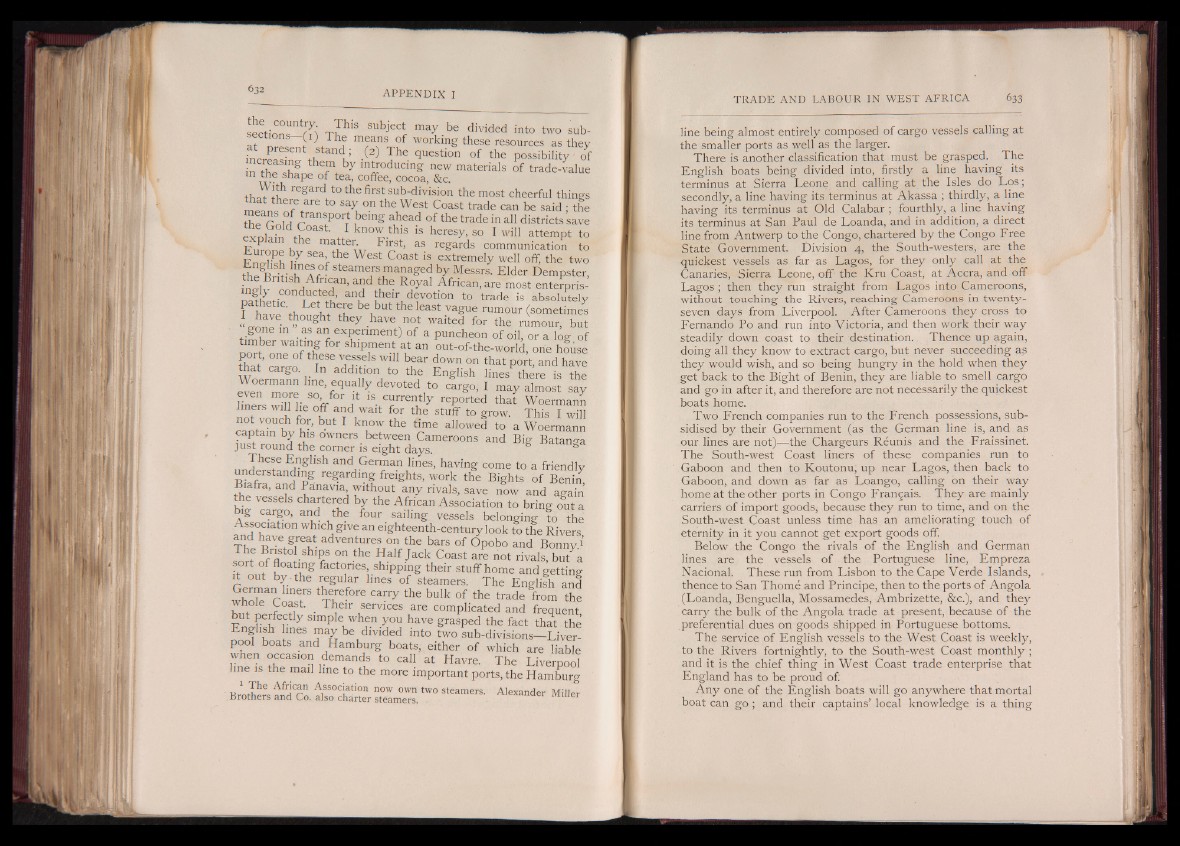
sectinn, ^ 'TU be divided i * J two Subi
r \ ,e m^ans ° f working these resources as they
inrrL ti! u’ question of the possibility' of
in Tw cW S 7 lntToducing new materials m the shape of tea, coffee, cocoa, &c. of trade-value
tW "I?1 regard to the first sub-division the most cheerful things
l e l i n f etare t0 Say ° n the West Coast trade can be said ; the
t h ? r l v f r ran!POrr ! g ahead of the trade in a]1 districts save
e t n S fP°a J kn° ^ this is heresD 50 1 will attempt to
Euronp h £ mai, ,'iT 1st’ as reSards communication to
ry sea> the West Coast is extremely well off, the two
^ R -V- steamers managed by Messrs. Elder Dempster,
incrh'n b ^uan, and the Royal African, are most enterpris-
Dathetir°n TUCr tP “ k I V d(?votlon to trade is absolutely
I havp \h Kwi,6 , e least vague rumour (sometimes
I have thought they have not waited for the rumour, but
I / 16 ln . as anf exPenment) of a puncheon of oil, or a log of
n™be™ f T £ for shipment at an out-of-the-world, one house
port, one of these vessels will bear down on that port, and have
that cargo In addition to the English lines there is the
^ ° ™ ann ’ fequally devoted to cargo, I may almost say
lliinneerrss wwidlln l,iVeS o° ffff and^ w1aSi- t Cif?orrr etnhdeE struepffo rtote dgr otwha. t TWhoies rmI awninll
not vouch for, but I know the time allowed to a Woermann
captain by his owners between Cameroons and Big Batanmi
just round the corner is eight days. fa
These English and German lines, having come to a friendly
undei standing regarding freights, work the Bights of Benin
Biafra, and Panavia without any rivals, save now and again
the vessels chartered by the African Association to bring out a
big cargo, and the four sailing vessels belonging to the
Association which give an eighteenth-century look to the Rivers
and have great adventures on the bars of Opobo and Bonny i
ssoorrtt Iofff fWloat-i ngT fac Ttor ies6, s?hiaplpf iJnagc kth Ceiora ssttu affr eh onmote raivnadl sg> ebtutitn ga
it out by-the regular lines of steamers. The English and
S h o lT r T 3 tbe,refore carrP the bulk of the trade from the
whole Coast. Their services are complicated and frequent
but perfectly simple when you have grasped the fact that the
English lines may be divided into two sub-divisions— Liverpool
boats and Hamburg boats, either of which are liable
when occasion demands to call at Havre. The Liverpool
line is the mail line to the more important ports, the Hamburg
1 African Association now own two steamers. Alexander Miller
Brothers and Co. also charter steamers. . miner
line being almost entirely composed of cargo vessels calling at
the smaller ports as well as the larger.
There is another classification that must be grasped. The
English boats being divided into, firstly a line having its
terminus at Sierra Leone and calling at the Isles do Los;
secondly, a line having its terminus at Akassa ; thirdly, a line
having its terminus at Old Calabar ; fourthly, a line having
its terminus at San Paul de Loanda, and in addition, a direct
line from Antwerp to the Congo, chartered by the Congo Free
State Government. Division 4, the South-westers, are the
quickest vessels as far as Lagos, for they only call at the
Canaries, Sierra Leone, off the Kru Coast, at Accra, and off
Lagos ; then they run straight from Lagos into Cameroons,
without touching the Rivers, reaching Cameroons in twenty-
seven days from Liverpool. After Cameroons they cross to
Fernando Po and run into Victoria, and then work their way
steadily down coast to their destination. Thence up again,
doing all they know to extract cargo, but never succeeding as
they would wish, and so being hungry in the hold when they
get back to the Bight of Benin, they are liable to smell cargo
and go in after it, and therefore are not necessarily the quickest
boats home.
Two French companies run to the French possessions, subsidised
by their Government (as the German line is, and as
our lines are not)—the Chargeurs Réunis and the Fraissinet.
The South-west Coast liners of these companies run to
Gaboon and then to Koutonu, up near Lagos, then back to
Gaboon, and down as far as Loango, calling on their way
home at the other ports in Congo Français. They are mainly
carriers of import goods, because they run to time, and on the
South-west Coast unless time has an ameliorating touch of
eternity in it you cannot get export goods off
Below the Congo the rivals of the English and German
lines are the vessels of the Portuguese line, Empreza
Nacional. These run from Lisbon to the Cape Verde Islands,
thence to San Thorne and Principe, then to the ports of Angola
(Loanda, Benguella, Mossamedes, Ambrizette, &c.), and they
carry the bulk of the Angola trade at present, because of the
preferential dues on goods shipped in Portuguese bottoms.
The service of English vessels to the West Coast is weekly,
to the Rivers fortnightly, to the South-west Coast monthly ;
and it is the chief thing in West Coast trade enterprise that
England has to be proud of:
Any one of the English boats will go anywhere that mortal
boat can go ; and their captains’ local knowledge is a thing